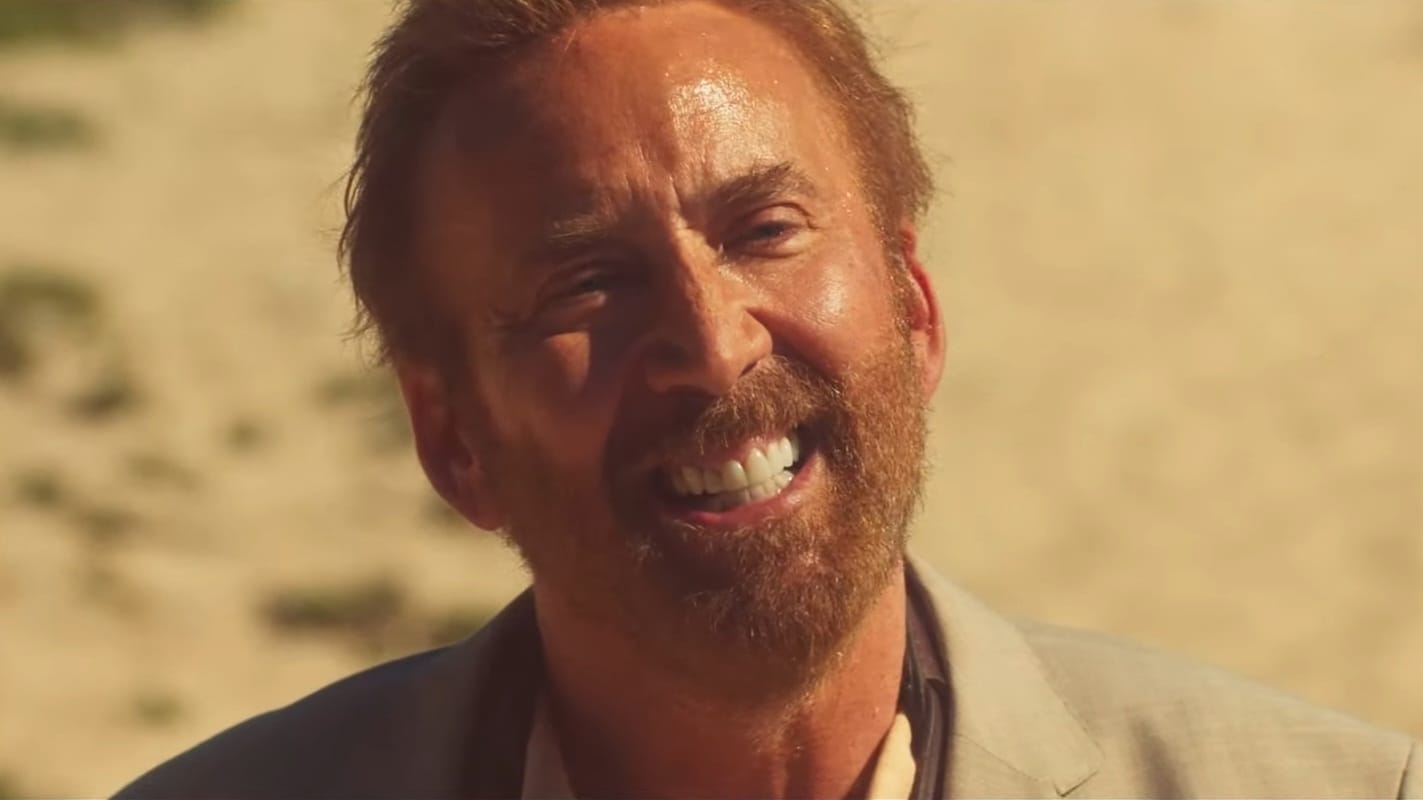Lorcan Finnegan’s “The Surfer” is a psychological thriller about a man trying to buy back his father’s old house. However, with Nicolas Cage in the lead role, it is far from a casual boiling-point affair. This absurdist film uses a balls-to-the-walls approach to show a man’s slow descent into madness.
It’s the kind of unhinged work that would make sense only with someone like Cage at the front and center, just as it did with John Woo’s “Face/Off” or Tom Gormican’s “The Unbearable Weight of Massive Talent.” Finnegan’s film embraces Cage’s unique acting approach to blend its heightened tension with his trademark humor. Yet, it’s not all fun and games for him, and the film slowly gets to the point of it all.
Spoilers Ahead
The Surfer (2024) Plot Summary & Movie Synopsis:
Written by Thomas Martin and directed by Lorcan Finnegan, this Nicolas Cage starrer is a chaotic trip through the mind of a middle-aged man who loses grip on his reality when confronted by hostile locals.
What happens in ‘The Surfer,’ starring Nicolas Cage?
The film follows a middle-aged man (Nicolas Cage) returning to his seaside hometown to buy back his childhood home. He sees it as a way to pay respect to his father, who tragically died on the local beach. However, things do not go his way as he enters the town. The locals do not let him and his son (Finn Little) surf in the ocean, and his estate agent (Rahel Romahn) suddenly reveals that he has received a better offer. Still, this Surfer doesn’t like to take no for an answer. He is ready to get whatever amount he needs to own that property and to ride on the waves without anyone’s permission.
Unlike him, the Kid doesn’t care about any of that. He is already annoyed that his father forced him to bunk his class. So, after getting insulted by the locals, The Surfer drives The Kid back home, but returns to get back at the local gang leader, Scully (Julian McMahon). At night, when he steps away from his car, Scully’s cronies steal his surfboard. When confronted, they beat him. So, out of options, he calls a cop (Justin Rosniak) to intimidate them. However, the cop happens to be Scully’s close friend, which jeopardizes his plan. Around this time, a local bum (Nicholas Cassim) adds fuel to his seething anger.
The bum talks about Scully’s entitlement as a trust fund baby, who is allegedly responsible for his son’s death. It makes the Surfer even more determined to get that house. He spends the night sleeping in his Lexus, which gets discharged by the morning, and so does his phone. He hands over his expensive watch to buy a cup of coffee, but someone spills it over him. It seems like luck’s not on his side. He can’t use his car, or his phone, or have access to his money. Even then, he stays in that town for that house. Scully’s cult doesn’t let him catch a break, which makes him lose his bearings.
The Surfer (2024) Movie Ending Explained:
Was the Surfer just imagining things all along?
The Surfer and Scully are equally determined to prove that they have an upper hand. Yet, unlike Scully, Surfer has no one that he can trust or rely on in that town. Scully steals the Lexus, and the cop convinces Surfer that he is an unhoused man living in a broken-down Subaru. Then onwards, Surfer finds it increasingly difficult to figure out what’s real. The cafe owner claims that he doesn’t have Surfer’s phone and that the watch (that Surfer lent him) is his father’s gift. His estate agent claims not to know him, and Scully’s teenage gang keeps harassing him. So, Surfer starts feeling like he is a bum.
Eventually, Surfer’s doubt is put to rest when he meets the photographer (Miranda Tapsell), who earlier took a picture of him in front of his Lexus. He realizes that Scully has been playing with his mind. So, while dehydrated, starved, and on the brink of insanity, he senselessly beats one of Scully’s goons. At that moment, Scully accepts Surfer as a part of their herd. However, he forces Surfer to burn the bum’s Subaru if he wants to surf. Left with no other option, Surfer follows Scully’s order.
What is The Surfer really about?

At the end of “The Surfer,” Surfer’s kid sees him burning down a car. Surfer convinces him that this is for the greater good. Together, they finally walk up to the ocean to do what they came for in the first place. However, before they can step into the water, the bum shows up there wearing the Surfer’s suit and sporting a gun. He pardons Scully’s men but forces Scully, Surfer, and his son to stay there. Surfer offers him his son’s shark tooth necklace to remind him that he is also there for his son. Bum lets Surfer leave after he agrees that he won’t buy the seaside house. In the final moments, Surfer and his kid start surfing while Bum shoots Scully and then shoots himself.
The bum’s suicide gives Surfer a deja vu of the time his dad’s body was found lying on the seashore. Considering all these father-son parallels, this Nicolas Cage thriller is mainly about the unwarranted and overwhelming burden of the codes of masculinity. It’s only when Surfer lets go of his unruly obsession that he feels free to own his identity as a Surfer. That allows him to relieve himself from the haunting memories of his father. After all, that house isn’t going to get him out of the cycle of toxic masculinity and prove that he is ‘a man.’ Instead, mending his relationship with his son can break the generational cycle that keeps men like him in shackles.
The Surfer (2024) Movie Themes Analysed:
Masculinity
Masculinity is the common thread in all the events from this Nicolas Cage starrer that shows its men battling with their self-perception. Surfer is about to get divorced. So, owning his childhood home seems like a way to prove his worth. However, a dwindling self-esteem, an unrealistic self-perception, and a lack of self-awareness turn him into a cocktail prone to emotional outbursts. He should have left the town for good after meeting the hostile locals and hearing the exponentially growing rate for that house. However, he is hellbent on buying it even at the cost of sanity.
That sense of entitlement connects him with Scully, who prides himself like a cult leader and hides his insecurities under the garb of a crisis of masculinity. He represents the kind of grifters that have become increasingly common, with men refusing to take criticisms as anything but offense while calling others snowflakes. The film explores these ironies without preaching them. That’s why it becomes a comprehensive breakdown of masculinity while being a gripping psychological study about a man (or men) with daddy issues.





![Incendies [2010] : The Horrors Of Revelations.](https://79468c92.delivery.rocketcdn.me/wp-content/uploads/2017/03/Incendies-768x448.jpg)


